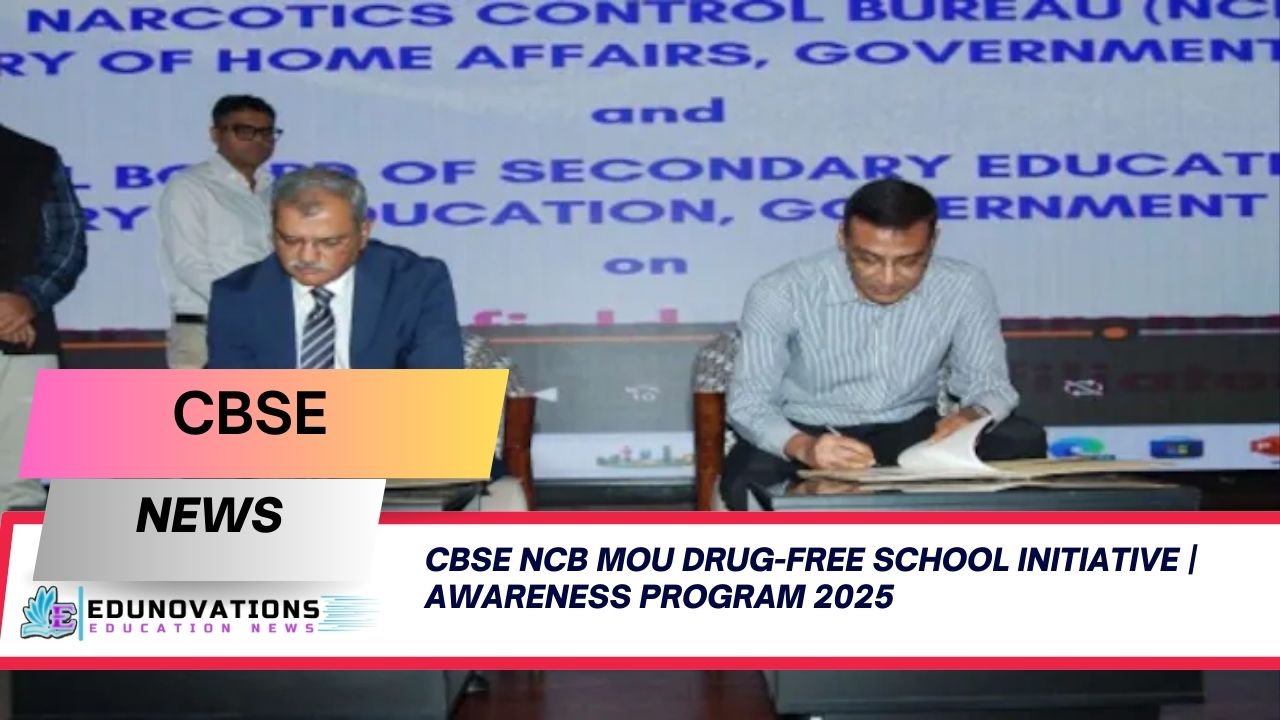Discover how the CBSE NCB MoU drug-free school initiative strengthens substance abuse prevention in Indian schools, empowering educators and students.
The CBSE NCB MoU drug-free school initiative marks a transformative step in India’s education system, focusing on preventing substance abuse and creating a safe, healthy school environment. On 4th September 2025, the Central Board of Secondary Education (CBSE) and the Narcotics Control Bureau (NCB), under the Ministry of Home Affairs, Government of India, formally signed a landmark Memorandum of Understanding (MoU) at CBSE Headquarters, Dwarka, New Delhi. This collaboration aims to strengthen joint efforts in raising awareness, educating students, and equipping educators and parents to combat substance abuse effectively.
MoU Signing Ceremony: Key Highlights
The historic MoU was signed by Shri Anurag Garg, IPS, Director General, NCB, and Shri Rahul Singh, IAS, Chairperson, CBSE, in the gracious presence of Shri Himanshu Gupta, IAS, Secretary, CBSE, along with senior dignitaries from both organizations including Sh Vishal M. Sanap, IRS, Deputy Director General, NCB, and Neeraj Kumar Gupta, IPS, DDG, NCB. HODs of CBSE and other senior officers also participated in the event, reinforcing the importance of collaborative action.
During the ceremony, Shri Anurag Garg emphasized the crucial role educational institutions play in combating drug-related challenges. He reaffirmed NCB’s commitment to conducting awareness campaigns, workshops, and counseling sessions for schools nationwide. Likewise, Shri Rahul Singh stressed CBSE’s dedication to safeguarding students’ well-being by providing schools, teachers, and parents with the knowledge and resources necessary to prevent substance abuse.
Shri Himanshu Gupta, Secretary of CBSE, highlighted that schools must create safe and supportive environments beyond academics. He added that timely intervention programs such as Tele-MANAS, which expands access to mental health care across India, can play an instrumental role in addressing student challenges effectively.
Comprehensive Framework for Substance Abuse Prevention
The CBSE NCB MoU drug-free school initiative establishes a structured framework for joint programs targeting students, educators, and communities. Key components include:
- Quarterly awareness programs in CBSE-affiliated schools
- Capacity-building workshops for teachers, counselors, and wellness educators
- E-modules on drug prevention for schools and students
- Community outreach programs to engage families and local stakeholders
- Counseling services for students and parents
A pilot program will be launched in 100 CBSE schools, employing a hub-and-spoke model to extend outreach nationwide. These initiatives are designed to empower schools to actively prevent substance abuse while nurturing a supportive learning environment.
Awareness Program: Engaging School Leaders
Following the MoU signing, CBSE organized an Awareness Program on the Prevention of Substance Abuse, attended by over 500 principals, counselors, and wellness teachers from CBSE schools across India. The program featured in-depth sessions focused on leadership, prevention strategies, and collaborative approaches to drug abuse prevention:
- “Leadership for Empowering the School Ecosystem” – Shri Ashutosh Agnihotri, IAS, Chairman & Managing Director, Food Corporation of India (FCI), discussed the critical role of school leadership in empowering educators to guide students toward healthier lifestyles.
- “Refuse the First Dose, Secure the Future” – Dr. Anees C., IRS, Deputy Director, NCB, explained preventive measures, peer communication strategies, and the role of families and schools in curbing drug abuse among youth.
The program concluded with an interactive Question–Answer Session, allowing principals and counselors to seek practical advice from experts and discuss strategies for strengthening drug-prevention initiatives at the school level.
Expert Insights and National Implications
Experts agree that early intervention and awareness are crucial to preventing substance misuse. According to the National Survey on Extent and Pattern of Substance Use in India, nearly 5% of adolescents between 10–17 years reported experimenting with substances, highlighting the urgent need for school-based interventions. The CBSE–NCB collaboration aims to target this demographic with structured programs, empowering students to make positive life choices.
Dr. Anees C. stressed that peer-to-peer engagement and counseling could significantly reduce the risks of early substance experimentation. Similarly, Shri Ashutosh Agnihotri emphasized leadership training for educators, as schools play a pivotal role in building resilience among students against social challenges.
By integrating modern preventive tools, digital learning modules, and community outreach, the CBSE NCB MoU drug-free school initiative is setting a benchmark for nationwide substance abuse prevention.
Benefits for Students, Teachers, and Parents
- Students:
- Access to awareness workshops and e-modules
- Counseling support for mental health and substance prevention
- Peer engagement activities to strengthen social support networks
- Teachers and Counselors:
- Capacity-building workshops on substance abuse prevention
- Leadership training to manage school ecosystems effectively
- Tools and resources for student engagement
- Parents and Communities:
- Awareness sessions on signs of substance abuse
- Community programs for early intervention
- Collaboration with schools for holistic development
Toppers Use Mind Maps to score more than 95%
NCERT Class 11th Commerce Mind Maps
Add to cartOriginal price was: ₹999.00.₹199.00Current price is: ₹199.00.NCERT Class 12th Chemistry Mind Maps
Add to cartOriginal price was: ₹199.00.₹75.00Current price is: ₹75.00.NCERT Class 12th Commerce Mind Maps
Add to cartOriginal price was: ₹999.00.₹199.00Current price is: ₹199.00.NCERT Class 12th Science Mind Maps
Add to cartOriginal price was: ₹999.00.₹199.00Current price is: ₹199.00.NCERT Mind Maps For Class 10th
Add to cartOriginal price was: ₹999.00.₹199.00Current price is: ₹199.00.
Purchase Today
Linkages and Resources for Educators
To support educators, CBSE has encouraged schools to leverage internal and external resources:
- Internal Resources:
- External Resources:
- Mart India Infotech – For schools’ contact information and digital solutions
Future Roadmap
The CBSE NCB collaboration will continue expanding through:
- Nationwide rollout: Extending programs to more CBSE-affiliated schools
- Digital initiatives: Online e-modules for continuous learning and awareness
- Monitoring and evaluation: Tracking impact of workshops and counseling sessions
- Community engagement: Expanding awareness programs to parents, local organizations, and regional authorities
This phased approach ensures that India’s youth receive timely interventions, promoting a healthier and more responsible generation.
FAQs: CBSE NCB MoU Drug-Free School Initiative
- What is the CBSE NCB MoU drug-free school initiative?
It is a collaborative program between CBSE and NCB to prevent substance abuse and create safe school environments. - Who signed the MoU for this initiative?
Shri Anurag Garg, IPS, Director General, NCB, and Shri Rahul Singh, IAS, Chairperson, CBSE, signed the MoU. - Which schools are involved in the pilot program?
Initially, 100 CBSE-affiliated schools will participate in the pilot program using a hub-and-spoke model. - What programs are included in this initiative?
Programs include quarterly awareness sessions, capacity-building workshops, e-modules, and counseling for students and parents. - How can teachers benefit from this initiative?
Teachers gain training on substance abuse prevention, leadership skills, and counseling strategies to support students. - Are parents involved in the program?
Yes, community outreach and counseling services are provided for parents to ensure holistic prevention. - What is the role of e-modules in this initiative?
E-modules provide accessible digital content on drug prevention for students, teachers, and counselors. - Which government program supports student mental health under this initiative?
Tele-MANAS is expanding access to mental health care across India and supports the initiative. - Who are the key experts involved in the awareness sessions?
Shri Ashutosh Agnihotri, IAS, and Dr. Anees C., IRS, provided sessions on leadership and preventive strategies. - How can schools access more resources for this initiative?
Schools can access NCERT courses, MCQs, and external resources like Mart India Infotech.














